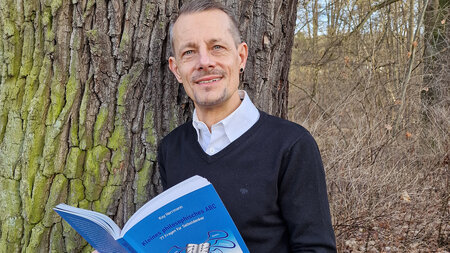Eintrag in der Universitätsbibliographie der TU Chemnitz
Heinrich, Matthias
Gaedke, Martin (Prof. Dr.) ; Schill, Alexander (Prof. Dr.) ; Eibl, Maximilian (Prof. Dr.)
Enriching Web Applications Efficiently with Real-Time Collaboration Capabilities
Kurzfassung in deutsch
Webbasierte, kollaborative Echtzeitanwendungen (z.B. Google Docs) erlauben es geografisch verteilten Nutzern, Dokumente gemeinschaftlich und simultan zu bearbeiten. Die Implementierung kollaborativer Echtzeitanwendungen ist allerdings aufwendig und komplex, da einerseits eine Nebenläufigkeitskontrolle von Nöten ist und andererseits die Nachvollziehbarkeit von nicht-lokalen Interaktionen mit dem gemeinsamen virtuellen Arbeitsraum gewährleistet sein muss (z.B. wer editiert wo).Um die Entwicklung kollaborativer Echtzeitanwendungen effizient zu gestalten, wurde eine Generische Kollaborationsinfrastruktur (GKI) entwickelt. Diese GKI stellt sowohl eine Nebenläufigkeitskontrolle als auch Komponenten zur Nachvollziehbarkeit von nicht-lokalen Interaktionen auf eine wiederverwendbare und nicht-invasive Art und Weise zur Verfügung. In drei dedizierten Studien, die sowohl Entwickler als auch Endanwender umfassten, wurde die Entwicklungseffizienz der GKI nachgewiesen. Dabei wurde die Entwicklungszeit, der Umfang des Quelltextes als auch die Gebrauchstauglichkeit analysiert.
Kurzfassung in englisch
Web applications offering real-time collaboration support (e.g. Google Docs) allow geographically dispersed users to edit the very same document simultaneously, which is appealing to end-users mainly because of two application characteristics. On the one hand, provided real-time capabilities supersede traditional document merging and document locking techniques that distract users from the content creation process. On the other hand, web applications free end-users from lengthy setup procedures and allow for instant application access. However, implementing collaborative web applications is a time-consuming and complex endeavor since offering real-time collaboration support requires two specific collaboration services. First, a concurrency control service has to ensure that documents are synchronized in real-time and that emerging editing conicts (e.g. if two users change the very same word concurrently) are resolved automatically. Second, a workspace awareness service has to inform the local user about actions and activities of other participants (e.g. who joined the session or where are other participants working). Implementing and integrating these two collaboration services is largely ine cient due to (1) the lack of necessary collaboration functionality in existing libraries, (2) incompatibilities of collaboration frameworks with widespread web development approaches as well as (3) the need for massive source code changes to anchor collaboration support. Therefore, we propose a Generic Collaboration Infrastructure (GCI) that supports the e cient development of web-based groupware in various ways. First, the GCI provides reusable concurrency control functionality and generic workspace awareness support. Second, the GCI exposes numerous interfaces to consume these collaboration services in a exible manner and without requiring invasive source code changes. And third, the GCI is linked to a development methodology that e ciently guides developers through the development of web-based groupware. To demonstrate the improved development e ciency induced by the GCI, we conducted three user studies encompassing developers and end-users. We show that the development e ciency can be increased in terms of development time when adopting the GCI. Moreover, we also demonstrate that implemented collaborative web applications satisfy end-user needs with respect to established software quality characteristics (e.g. usability, reliability, etc.).
| Universität: | Technische Universität Chemnitz | |
| Institut: | Professur Verteilte und selbstorganisierende Rechnersysteme | |
| Fakultät: | Fakultät für Informatik | |
| Dokumentart: | Dissertation | |
| Betreuer: | Gaedke, Martin (Prof. Dr.) | |
| ISBN/ISSN: | 978-3-944640-25-9 ; ISSN 2199-5362 online ; ISSN 2199-5354 print | |
| URL/URN: | http://nbn-resolving.de/urn:nbn:de:bsz:ch1-qucosa-149948 | |
| Quelle: | Chemnitz : Universitätsverlag der Technischen Universität Chemnitz, 2014. - 207 S. - Doctoral Dissertations in Web Engineering and Web Science ; 1 | |
| Freie Schlagwörter (Deutsch): | Computerunterstützte Gruppenarbeit | |
| Freie Schlagwörter (Englisch): | Real-Time Collaboration, Groupware, CSCW, Web Engineering, Web Applications, Concurrency Control, Workspace Awareness | |
| DDC-Sachgruppe: | Datenverarbeitung; Informatik | |
| Tag der mündlichen Prüfung | 02.04.2014 |




